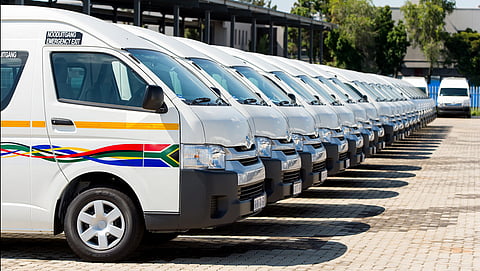South Africa’s taxi industry: Public transport or public enemy? - Fanie Bouwer
Key topics:
Minibus taxis carry 70% of commuters but fuel violence and crime.
Taxi bosses use intimidation, attacks, and political ties to dominate.
Effective regulation exists only in some areas; nationwide action lacking.
Sign up for your early morning brew of the BizNews Insider to keep you up to speed with the content that matters. The newsletter will land in your inbox at 5:30am weekdays. Register here.
Support South Africa’s bastion of independent journalism, offering balanced insights on investments, business, and the political economy, by joining BizNews Premium. Register here.
If you prefer WhatsApp for updates, sign up to the BizNews channel here
By brigadier Fanie Bouwer
The minibus taxi industry is South Africa’s transport lifeline but also its biggest nightmare.
Around 250,000 taxis carry more than 70% of commuters daily, yet behind this vital service lurks a mafia-style empire built on intimidation, violence and political protection.
I once called the industry a “necessary evil.” That was years ago when I dealt with taxi bosses as part of the police’s Internal Stability Division.
Even then, it was clear they weren’t just businessmen. They were power brokers, enforcing their will with fists, bullets and fear.That power has only grown. The latest victims? E-hailing services like Uber and Bolt.
Instead of competing, taxi associations torch cars, beat drivers, and threaten parents into using their taxis for school transport.
On 13 August 2025, at Maponya Mall in Soweto, an e-hailing driver was shot dead, and his car was set alight. Another vehicle was torched. The next morning, residents blocked roads in protest.
The police? Missing in action.Compare that with Cape Town, where, about two years ago, the City towed taxis that blocked roads and fined owners heavily. Elsewhere in South Africa, such decisive action is rare.Why?
Anecdotal evidence suggests too many police officers, councillors, and politicians are entangled in the taxi business.
Read more:
Allegations of taxi ownership by officials have circulated for years. The Hawks probed such links as early as 2014.
When politicians rely on taxi bosses for votes and money, enforcement is the first casualty.
Taxi violence is not random. It is guerrilla warfare. Blockades, ambushes, and assassinations are sudden, unpredictable, and ruthless. The State has never had a firm grip on it.The so-called regulators don’t inspire confidence either.
Former Transport Minister Fikile Mbalula vowed in 2021 that taxi crime “would not be tolerated.”Gauteng Premier Panyaza Lesufi recently promised action through a provincial “war room.” It’s not going to help—he’s clutching at straws.
Meanwhile, commuters continue to live in fear.The Western Cape stands almost alone in showing backbone.
In 2021, Transport MEC Daylin Mitchell shut down the deadly B97 route to curb taxi violence. It was controversial, but it worked. Elsewhere, political will is absent.
Here lies the uncomfortable truth: South Africa’s taxis operate as both an essential service and a criminal cartel. They are indispensable for commuters yet operate outside the law, shielded by political connections. Until that conflict of interest is broken, nothing will change.
The time has come to put the taxi crisis on the national agenda. This is not just about transport—it’s about crime, corruption, and the rule of law.
Adding this matter to the agenda of the National Convention may be the only way to drag this industry out of the shadows and hold both its leaders and their political protectors accountable, with clear legislation and regulations to empower authorities to reorganise the industry properly.
Until then, ordinary South Africans will remain hostages to a transport system that looks less like a public service and more like organised crime on wheels.

